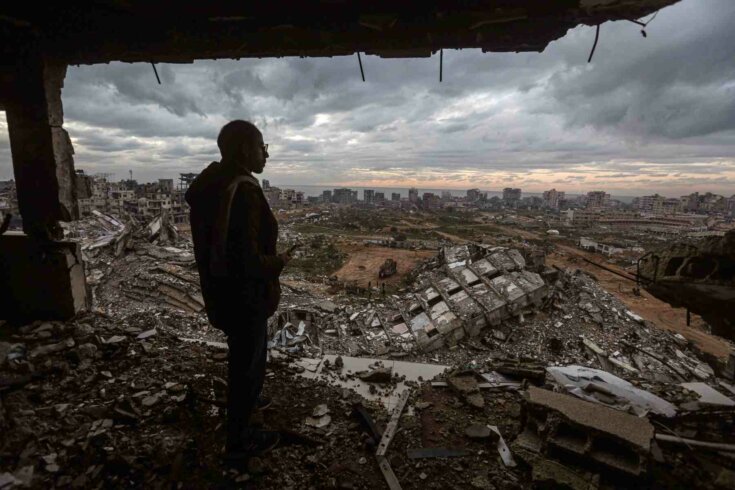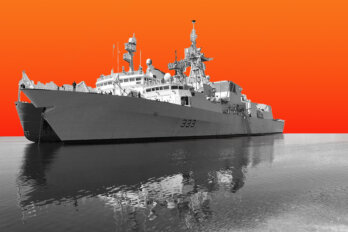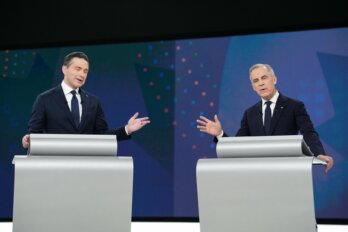L anguage is never sufficient. There is not enough of it to make a true mirror of living. In this way, the soothing or afflictive effect of the stories we tell is not in whether we select the right words but in our proximity to what the right words might be. This is not some abstraction but a very real expression of power—the privilege of describing a thing vaguely, incompletely, dishonestly is inseparable from the privilege of looking away.
When I wrote a novel called American War, I found that one of the most popular uses of that phrase was as a Vietnamese moniker for what in the United States is called the Vietnam War. And what in the United States is now called the Civil War once had dozens and dozens of euphemistic names (of which one of the more memorable is “The Late Unpleasantness”).
In March 2013, while still working as a full-time reporter, I joined a team of Google employees on a trip to Iqaluit, the capital of Nunavut. The team was travelling there to map the far northern territory for Street View, the popular Google feature which allows users to virtually wander through much of the paved world.
It’s a three-hour flight from Southern Ontario to Iqaluit, a city of about 7,400 people. There’s a hotel, a grocery store in which a few rolls of toilet paper went for something like $40, a shawarma place run by two Syrian guys. It’s small, isolated from and largely ignored by Canada’s political power centres.
For the Google team, this would be mostly a public relations exercise, similar to, if not likely to be used as much as, the Street View mapping of the trails on the Grand Canyon—Look what we can do. It was too expensive to ship the Street View car all the way up north, so instead the team brought a backpack with a long cylindrical attachment that rose about five feet into the air, a camera mounted on top. They’d map the place on foot.
On our second day in town, the company’s engineers and PR people set up a meet-and-greet with the Indigenous Elders of Iqaluit, mostly as a sign of respect but also because they had very concrete questions about the place—they’d never been there before, had no idea where to start.
“What are the most important thoroughfares?” one of them asked.
“In winter or in summer?” one Elder replied.
It had not occurred to the Google map makers that what might be akin to a highway in December might become water in July. Their cognitive toolkit had no means of grappling with something like this. Until now, their lexicon had been sufficient to describe everything they deemed worth describing.
I t may as well be the case that there exist two entirely different languages for the depiction of violence against victims of empire and victims of empire. Victims of the empire, those who belong, those for whom we weep, are murdered, subjected to horror, their killers butchers and terrorists and savages. The rage every one of us should feel whenever an innocent human being is killed, the overwhelming sense that we have failed, collectively, that there is a rot in the way we have chosen to live, is present here, as it should be, as it always should be. Victims of empire aren’t murdered. Their killers aren’t butchers—their killers aren’t anything at all.
Victims of empire don’t die. They simply cease to exist. They burn away like fog.
To watch the descriptions of Palestinian suffering in much of mainstream Western media is to watch language employed for the exact opposite of language’s purpose—to watch the unmaking of meaning. When the Guardian runs a headline that reads, “Palestinian Journalist Hit in Head by Bullet During Raid on Terror Suspect’s Home,” it is not simply a case of hiding behind passive language so as to say as little as possible and in so doing risk as little criticism as possible.
Anyone who works with or has even the slightest respect for language will rage at or poke fun at these tortured, spineless headlines, but they serve a very real purpose. It is a direct line of consequence from buildings that mysteriously collapse and lives that mysteriously end to the well-meaning liberal who, weaned on such framing, can shrug their shoulders and say: Yes, it’s all so very sad but, you know, it’s all so very complicated.
Some things are complicated. Some things have been complicated.
There is an art to this sort of thing. Of all the aftereffects of the War on Terror years, the most frequently underestimated is the heightened derangement of language for the purpose of sanitizing violence. It’s a phenomenon that’s by no means unique to that one moment in American history, but anyone who lived through the NATO invasion of Afghanistan and the decimation of Iraq will be familiar with the hallmark uses of this shadow vocabulary.
No one, during those years, was ever tortured, only subjected to enhanced interrogation. When a soldier pulling at a joystick thousands of miles away mistook a wedding party for a terror cell and set a missile-wielding drone to incinerate the lot, nobody was killed; there was only some collateral damage (a term first coined to describe the killing in Vietnam). No prisoners, who require a prison sentence, only detainees, who can be held forever without charge. And when those detainees, after years of confinement to cells not much bigger than broom closets, went on hunger strikes, they were engaged in asymmetric warfare against their captors.
It is easy enough to focus on the words, the phrases—their plain, malicious absurdity. But alone, words can obscure only so much. It is evident now, in this latest round of mass killing, that the machinery of state violence benefits just as greatly from the dehumanizing power of what is assumed as much as it does from what is said. The Bush- and Obama-era practice of labelling just about any man killed by the US military as a terrorist until proven otherwise is one of the most pernicious policies to come of the post-9/11 years, and for good reason.
It doubly defiles the dead, first killing then imposing upon them a designation they are no longer around to refute. It also renders them untouchable in polite society. Should a drone vaporize some nameless soul on the other side of the planet, who among us wants to make a fuss? What if it turns out they were a terrorist? What if the default accusation proves true and we by implication be labelled terrorist sympathizers, ostracized, yelled at?
It is generally the case that people are most zealously motivated by the worst plausible thing that could happen to them. For some, the worst plausible thing might be the ending of their bloodline in a missile strike—their entire lives turned to rubble and all of it pre-emptively justified in the name of fighting terrorists who are terrorists by default on account of having been killed. For others, the worst plausible thing is being yelled at.
O ne day in 2008, while reporting from the military courtroom in Guantánamo Bay, a few other journalists and I were handed copies of a motion filed by one terror suspect’s defence team. We had, by then, become used to the chessboard nature of these documents, full of black squares and rectangles that hid the things the military had deemed too dangerous for us to read, for the public to know. Officially, there existed a detailed formal guideline that was supposed to explain exactly why the military chose to withhold certain information, related almost always to matters of national security. But in reality, these explanations were often nonsense.
There is a complex and fascinating psychology behind what gets blacked out—in the earliest editions of Guantánamo Diary, a book-length collection of the journals kept by Mohamedou Ould Slahi during his years-long imprisonment, there is a scene in which he recounts being interrogated by several soldiers. The censors, before they would allow publication of the book, blacked out only the pronouns of the female soldier involved. (Eventually, in later editions, the sections were uncensored.) In the motion we were handed that day in Gitmo, the thing blacked out was a copy of a New York Times article the defence lawyer had attached so the judge didn’t have to go search it out himself. Someone had decided a story in the most well-known newspaper on the planet was too dangerous for us to read.
Allowed to wield silence so freely, any institution will become insatiable. It’s not only that the absence of information allows those complicit in but unaffected by wrongdoing to look away. The silence itself becomes an empty canvas, onto which any fantasy can be painted. When every last Palestinian journalist has been killed, maybe there will never have been any Palestinian journalists at all. Maybe they will have all been terrorists or supporters of terrorists or whatever adjacency to terror is sufficient to scare off those who, in possession of something approximating a soul, might otherwise look upon such obvious assassination and say: This is wrong. Absent an act to describe and the language to describe it, we are capable of believing nothing, or multiple contradictory things, or anything at all.
There is, and has been for decades, a version of this phantom reality imposed on the Palestinian people, one in which they left their land willingly and were never expelled, never terrorized into movement. One in which, as Golda Meir stated and so many Israeli politicians have echoed since, there was no such thing as Palestinians. One in which Palestinian identity, if it did exist, was meaningless and certainly conferred no rights. One in which these nonpeople were nonetheless treated well by the government and institutions that now rule over them, given good labourer jobs, and sometimes even afforded free passage on the roads they’re allowed to drive on and the buses they’re allowed to board and behind the walls that are there purely to keep everyone safe. One in which every failed peace agreement is the fault of these intransigent, unreasonable people and not of the state whose officials to this day gloat openly about never allowing a Palestinian state to exist. One in which every round of violence is the sole consequence of the last Palestinian act of violence. One in which tens of thousands of dead children have only their support of Hamas to blame—an organization that last won an election before those kids were born.
There’s safety in this story, safety from one’s own conscience. Because in this story the weight of indictment shifts onto the dispossessed, the disappeared, the dead, and one can continue as is, comfortable in the knowledge that history, narrative, language itself demand that the killing continue. Or, better yet, have nothing to say at all.
If you visit Iqaluit on Street View today, you’ll find a long unnamed road that juts out into the bay. In the pictures, the ground is ice. On the viewfinder, you’ll be walking on water.
Excerpted from One Day, Everyone Will Have Always Been Against This by Omar El Akkad. Copyright © 2025 Omar El Akkad. Excerpted by permission of Alfred A. Knopf, an imprint of the Knopf Doubleday Group, a division of Penguin Random House LLC. All rights reserved.





